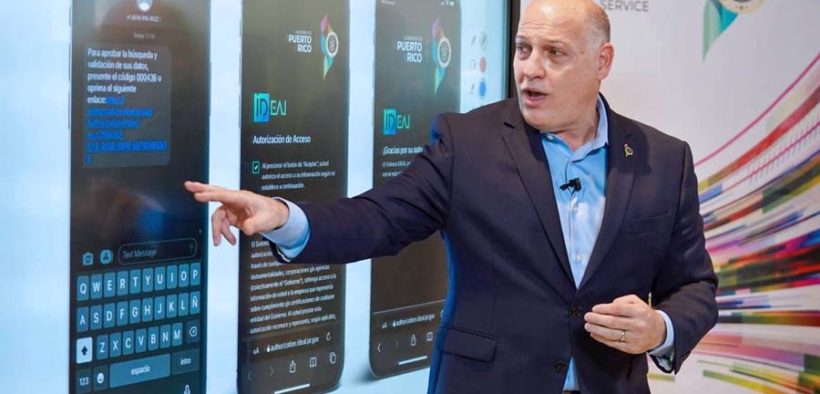Gov’t prepares to offer subsidy on telecom equipment when broadband incentive ends

As the clock ticks closer to the possible end of subsidies for broadband connections under the Affordable Connectivity Program (ACP), the local government is preparing to offer several cost-savings alternatives for consumers who will no longer receive the $30 monthly discount.
In an interview with News is my Business, Enrique Völckers-Nin, the government’s deputy chief of staff on Innovation & Technology, said that while the administration cannot cover the $20 million a month in federal subsidy funds for more than 663,000 households in Puerto Rico, it is exploring other ways to mitigate the impact.
“We’re going to offer a subsidy program, but it won’t be for connectivity. It will be to purchase equipment, given to people who don’t have a phone, tablet or computer. But we don’t have in mind a subsidy program to cover part of the costs of broadband service, because we’re talking about $20 million a month, and that would deplete our fund,” said Völckers-Nin. “We’ll be releasing information on that later this year.”
In January, the Federal Communications Commission released an order announcing steps to phase out the ACP due to the unavailability of additional funding from Congress under the Bipartisan Infrastructure Law. The FCC has given telecom companies a checklist with key dates and instructions to prepare subscribers for the program’s potential conclusion.
Existing ACP funds are expected to run out by April or May, but sectors are banding together to get Congress to extend program funding at least until September.
However, no progress has been made on the bills filed in Congress – H.R. 6929 in the House, which proposes injecting another $7 billion into the program, and S. 3565 in the Senate.
“There has been no movement at all. There are many representatives co-signing the bill, but there has been a lot of resistance in the Senate,” Völckers-Nin noted.
Two weeks ago, Völckers-Nin was part of a delegation that participated in the National Governors Association meeting in Washington, during which he said there was a chance to speak to other governors facing the same funding cliff, as well as staff from Sen. Ted Cruz’s office.
“We spoke to different governors to see how we can come together to lobby in Congress to approve the funds. Democrats are focused on providing the funding to citizens, while Republicans want more restrictive qualifications, so there aren’t as many households getting the discount, saving some money,” he said.
As it stands, the eligibility requirements for ACP benefits are broad – for example, if the household has a college student who receives a Pell Grant, it’s eligible; if the person is a veteran, they’re eligible; if the person is in a bankruptcy proceeding, they’re eligible.
“What we’re trying to help out with is going into the data that telecom providers in Puerto Rico have to determine how many people benefiting from the ACP program truly need that money to connect,” Völckers-Nin stated. “There are automatic eligibility requirements that don’t necessarily imply that you depend on that subsidy to be able to connect.”
The government is working with telecom providers to determine the accurate number of local beneficiaries, “a process that’s complex because it’s confidential information, and we’re working with providers to assure them that the information will be managed confidentially.”
The goal is to have that lower number by April to be able to forward the data to the federal government, he said.
In the meantime, telecom providers have begun alerting ACP customers about alternatives, including the Lifeline program, which offers a $10 monthly aid.
“That’s another thing. Right now, there are several telecom-related subsidy programs, like Universal Service, Lifeline and the ACP. They [federal lawmakers] would like to join them so there aren’t three different programs with different eligibility criteria,” Völckers-Nin acknowledged, noting unifying the programs would be a lengthy process.
NTIA OKs Puerto Rico’s Digital Equity Plan
In related news, Völckers-Nin confirmed the approval of Puerto Rico’s Digital Equity Plan by the National Telecommunications and Information Administration (NTIA).
“Since we received a grant for planning the Digital Equity Act in September 2022, the administration has been working with communities across Puerto Rico to develop our Digital Equity Plan, which NTIA officially approved this week,” he said. “With this approval, representing a significant achievement for the Smart Island program, Puerto Rico will have access to the Digital Equity Capacity Grant, which we estimate will be around $14 million.”
The plan, PR Vol. 1, focuses on the Equity, Access and Broadband Implementation Fund (BEAD), established by the Infrastructure Investment and Jobs Act, which provides funds to build high-speed internet infrastructure and support related workforce training, providing necessary equipment assistance, and encouraging local partnerships for network connectivity.
It prioritizes underserved areas lacking internet access or with speeds of less than 25/3 megabits per second (Mbps) and underserved locations that have access to less than 100/20 Mbps.
The Digital Equity Plan promotes digital equality, supporting U.S. territories in broadband adoption to ensure community access to affordable, high-speed internet.
The funds will develop and monitor equity plans, grant awards for plan development, improve public resource accessibility, implement equity plans and digital inclusion activities, offer digital literacy education, and facilitate high-speed internet adoption for covered populations.
“As we have explained, digital equity is the goal we have as a program, which means ensuring that every Puerto Rican has access to quality internet service and speed in connectivity that reaches citizens in their homes, businesses or offices. We thank all the people who sent us their comments and who in one way or another collaborated to ensure that they were included in the plan created for the program and approved by the NTIA,” concluded Völckers-Nin.









